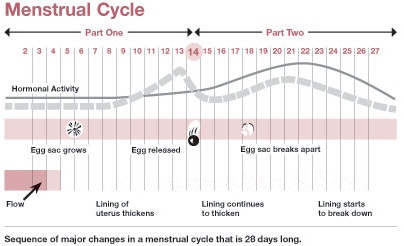Irregular Periods or also called Oligomenorrhea for those of you without a dictionary– is a medical term which refers to irregular or infrequent menstrual periods. Intervals may vary, but an irregular period is usually defined as a menstrual cycle that is consistently shorter than 21 days or consistently longer than 36 days. You can also be considered “irregular” if your cycle length varies significantly from cycle to cycle, sometimes lasting 28 days, then 40 days, then 32 days.

Irregular Periods (Oligomenorrhea) : image : plannedparenthood.org
Woman with a normal menstrual cycle will have between 11 and 13 menstrual periods in one calendar year, which means that they will have up to 13 chances to conceive each year. Women with irregular periods however, may not have as many chances to conceive. This means that the road to conception for women with irregular periods may be longer, as determining their ovulation date is substantially more difficult.
Having irregular periods doesn’t render someone infertile, it is still very much possible to become pregnant. By understanding the causes of irregular periods and the steps you can take to restore cycle regularity, it will make it that much easier for you to conceive.
Causes Of Irregular Periods
Experiencing irregular periods from time to time is considered normal, especially during times of illness or stress. For the most part, their cycle regularity will return as soon as their times of stress and illness have passed.
For cases of chronic irregularity, it’s highly likely that there’s an underlying issues pertaining to hormonal imbalance that needs to be resolved. These hormonal problems are usually due to the imbalance between the levels of estrogen and progesterone in the body, which impacts the frequency of menstruation and ovulation.
One of the most common cause of hormonal imbalance is the medical condition known as Polycystic Ovarian Syndrome (PCOS). This condition causes the stimulation of multiple follicles that produce high levels of estrogen but without the successful release of an egg. This results in menstrual bleeding even though no ovulation has occurred.
Women who have eating disorders may also develop hormonal imbalance, their hormonal imbalance coupled with their eating disorder can result in irregular periods. In some cases, they can also have a complete absent of menstrual periods (amenorrhea).
Other possible causes of irregular periods:
• Excessive physical exercise
• Dietary changes
• Lack of adequate nutrition
Irregular Periods Treatments
Regulating Your Periods : The best thing you can do to try and regulate your cycles and increase the frequency of your ovulation is by making some lifestyle changes. These changes may help you restore the delicate balance of your hormones and in turn, regulate your periods.
Here are some of the treatments things that you can do:
• Adopt a healthy, well-balanced diet. It’s time to kiss that vending machine goodbye. You should aim to incorporate more whole grains, fruits and vegetables to your diet. Foods that are high in refined carbohydrates and fat are a big NO!
• Attain your ideal weight. Being overweight is generally unhealthy. Try to lose a few pounds by way of restricting calories and doing physical exercises. They’ll work wonders for you. Conversely, if you are underweight, try adding on a few pounds. Extremely low body fat can be associated with low estrogen levels, which can cause cycle irregularity.
• Take a fertility-enhancing supplement. In order to conceive, every woman must do whatever they can to make sure that everything is in place. That includes taking fertility enhancing supplements that promotes hormonal balance. Who knows, maybe these supplements will help you regulate your periods and put your cycles back on track.
Related post :
– Low Sperm Count



 Saving...
Saving...